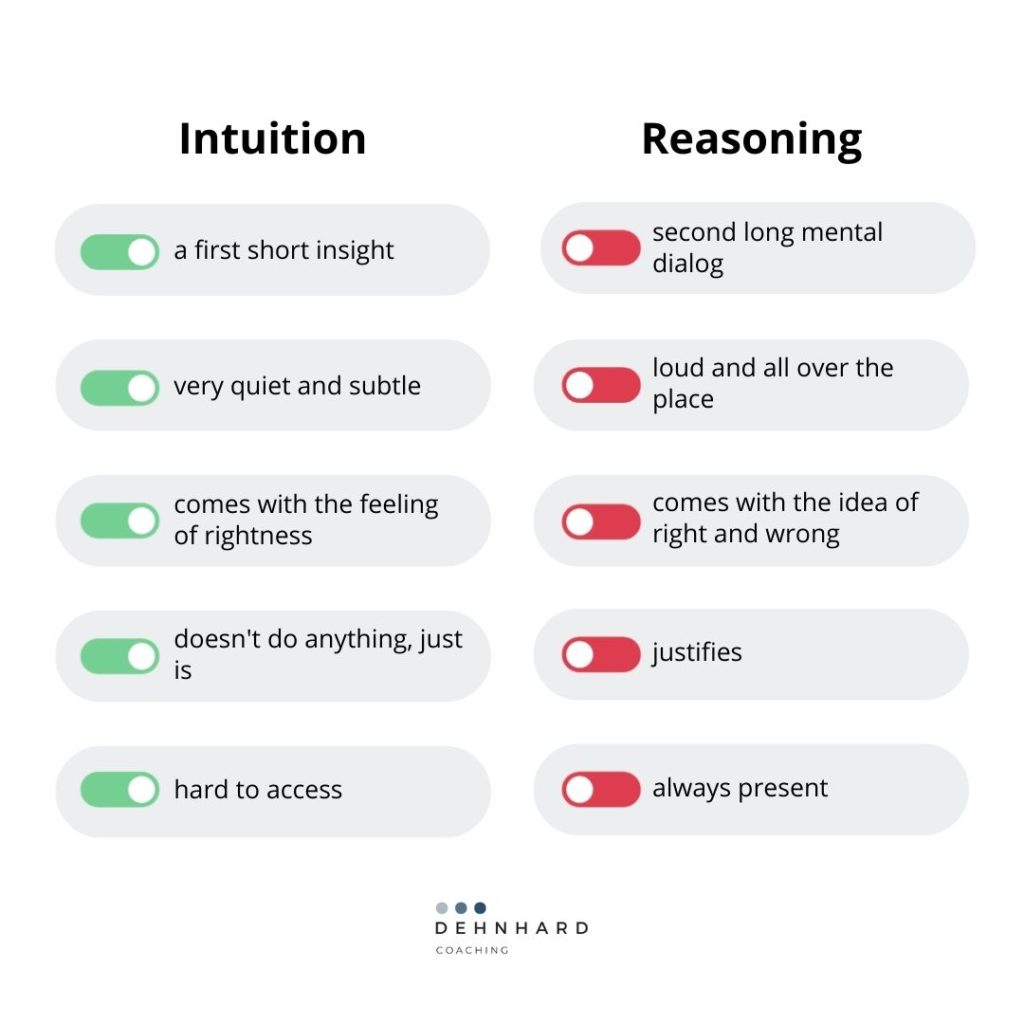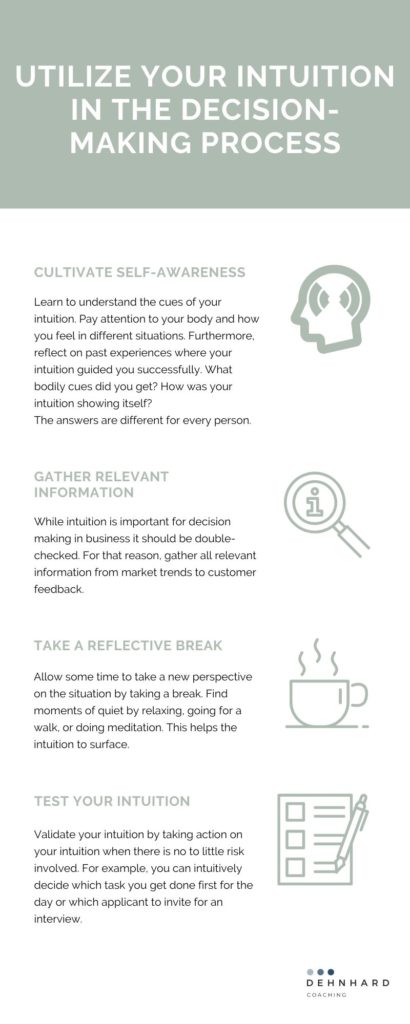Imagine running a successful houseboat restaurant, only to face a sudden downfall after making a big investment without careful consideration. This is what happened to one of my clients. After pouring all the profits into buying a new houseboat for a second restaurant, things took an unexpected turn, forcing him to close his business and leaving him in debt. Was it just bad luck, or did his intuition and decision-making process play a significant role?
The truth is, decision-making in business can make or break your success. Whether it’s the daily choices you make or the major decisions during challenging times, finding the right balance between intuition and analysis is crucial. In this article, we will explore the importance of intuition in the process of decision-making in business and provide practical tools to help you utilize your intuition when making decisions.
Are you ready to unlock the power of intuition? Let’s delve into the world of using your intuition in business decisions.
Trust Your Gut: Harnessing The Power Of Intuition
During the early stages of building my coaching business, I recall a memorable moment in a hotel where I hosted weekly workshops. One day, a bold-headed man walked in, and I had an instant intuition to invite him to join my workshop. Trusting that gut feeling, I approached and invited him. He kindly accepted and attended the workshop that evening. While waiting for other participants, I focused my energy on providing the best experience for him. Little did I know, he was the owner of the place. After the workshop, he expressed his gratitude and granted me the creative freedom to offer more workshops. This encounter led to a lasting relationship, as he introduced me to other business owners who eventually became clients.
This story illustrates the power of intuition. It revealed something to me that I wasn’t initially aware of: the importance of that man. Reflecting on past experiences where I trusted my intuition and experienced remarkable outcomes, I realized the value of embracing those subtle insights.
How many times have you followed your intuition and seen it pay off? Conversely, when was the last time you ignored your intuition, only to discover it was right?
Where Intuition Comes From
Intuition is the ability to understand something instinctively, without the need for conscious reasoning.
For a long time, intuition was not scientifically proven when in 2016 the researchers Galang Lufityanto and Chris Donkin conducted a study. Participants took a test on a computer while simultaneously positive or negative images flashed so quickly that they couldn’t be recognized consciously on another monitor. Without their knowing, participants who had positive images flash had a faster response time and felt more confident about their decisions. This study proved that your brain recognizes aspects of your environment that you normally don’t notice.
In my case, I probably processed the way that bold-headed man walked into the restaurant with a posture that was signaling “this is my place” as well as how he approached the employees. This then sparked my intuition to invite him.
Intuition vs. Reasoning
When I asked my clients, “What is your intuition saying about this idea?” I’ve noticed a common pattern. About 99% of the time, they begin sharing their thoughts and opinions on whether the idea is great or won’t work out. However, I quickly interrupt them in the first sentence, explaining that this is not their intuition but rather their conscious reasoning at play. Then, I ask the question again. It’s fascinating to witness that about 99% of the time, they fall silent and eventually provide an answer that often sends shivers down my spine.
“That’s it,” I explain, and the clients nod in agreement. It’s a great reminder that intuition often gets a bad reputation due to this very dynamic. People mistakenly attribute their reasoning to intuition and then hold their intuition responsible for any missteps or wrong choices they make.
This brings me to the most significant obstacle in utilizing your intuition for decision making: distinguishing it from the surrounding noise, such as analytical thinking, fear, or doubt. It’s crucial to develop the skill of discerning the voice of intuition amidst all these influences, as it holds the key to making truly insightful and successful decisions in business.

Decision Making In Business With Your Intuition
Using intuition when making decisions in business can be a valuable asset. While analysis and data-driven approaches are important, intuition can provide insights and perspectives that may not be immediately apparent. Inherent in everyone is an intuition. But for some the intuition not as easy to cultivate than for others. For that reason, here are some steps to effectively utilize your intuition in the decision-making process:

Embracing Risk: Making Decisions In Ambiguous Situations
After my bachelor’s degree, I traveled through Mexico. In the middle of the trip, I was ending up in a town in which I felt so comfortable and happy in and I faced an opportunity that would change my life and business completely. That opportunity was to leave the familiar behind to stay in Mexico to give trainings. Now at that time, I had an apartment, a job, and a dream of becoming a coach back home and I had to decide whether I follow this opportunity in Mexico. Rationally thinking, going back home would be the safer choice to make but there was something about this opportunity in Mexico which ignited my passion and my intuition was saying a big YES to this opportunity.
After some thought, I made the ambiguous decision to stay in Mexico. In the beginning, I had no money, one friend, a bed at the friend’s place, and only the idea of offering trainings but no concrete collaboration. Throughout the entire time I lived there I had so many challenges that I needed to overcome and so many business decisions I had to make. From having empty training rooms during the first weeks of offering them to having to learn how to sell my coaching programs to people to survive. But always with the guiding light of my intuition.
Looking back now that huge risk I took back then was the stepping stone for my entire career as a coach. I would not be where I am without that ambiguous intuitive decision back then. There was a huge risk involved but something inside of me was knowing that everything will be ok: my Intuition
When it comes to making decisions in business, you often get faced with opportunities that make you consider the status quo and go embark on a new journey. And that decision may not always be right but worth considering. Your intuition can be a great guide in these moment. From my experience, I have never learned so much in my business as I did during my time in Mexico. Because I was forced to make it work.
Decision Making In Business: Is Your Intuition Always Right?
Thinking back to the client that made a wrong choice when buying a second houseboat restaurant, maybe his intuition was telling him to take this opportunity. Maybe it was the opposite.
Your intuition is not the magic key to unlocking all success. Nor is it a replacement for analytical thinking. Intuition is just another element of decision making in business. And you need to find out how much you are comfortable following your intuition in every situation.
Maybe your intuition is good for clarifying the direction your business is heading in and not for investment decisions. Maybe you use it to justify analytical decisions. Whatever works for you is a success.






